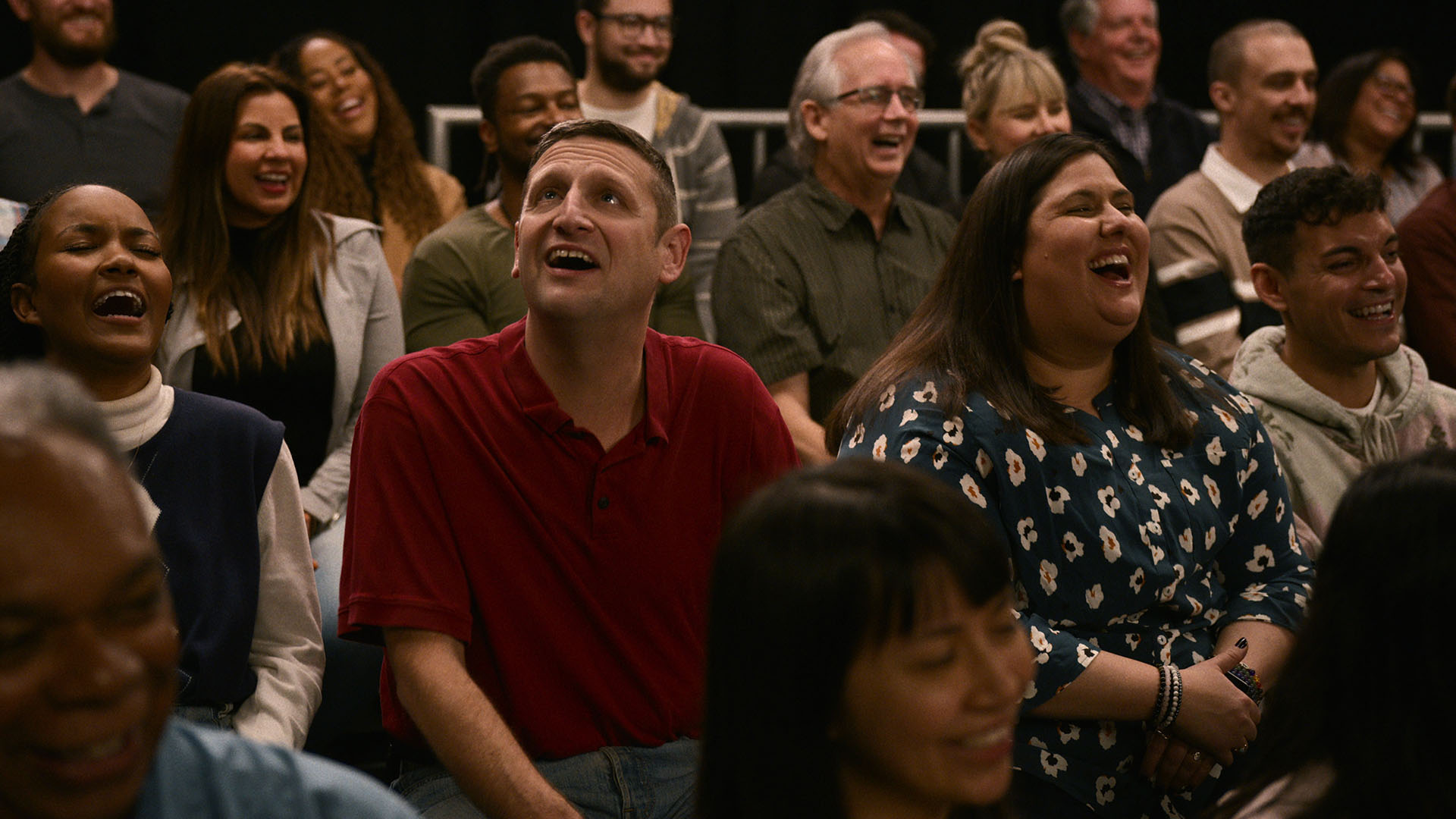Are triples best? Tim Robinson is back with I Think You Should Leave season three

Are triples best? In honour of the new season launch of I Think You Should Leave with Tim Robinson, Sarah Thomson takes a look at what makes Robinson’s Netflix comedy so memorable / memeable.
“Has this ever happened to you?”
Yes. Or, at least, close enough. Perhaps not to the (often truly bizarre) destinations of the average Tim Robinson bit but, like most sketch comedy, the majority of setups across the three seasons of I Think You Should Leave start with an intensely relatable core—job interviews, office culture, friend group dynamics, baby showers, service jobs, infomercials. All are then peppered with characters exhibiting the two funniest bedfellows of human social interaction: wild insecurity and/or phenomenal confidence.
Via escalations of tone, a healthy dose of the puerile, complete U-turns in narrative, and pitch-perfect casting we’re taken from the realms of the real through to the surreal: reputation vacuum cleaners, coffin flops, turbo teams, and sloppy steaks.
So far, so potential formula, no? Perhaps. At the risk of trying to describe the indescribable, let’s take a look at some of the elements that have made Robinson’s approach to sketch comedy spawn peals of laughter upon multiple rewatches, staunch legions of fans, and so-very-many memes.
“[sighs] Shouldn’t have had such a sloppy mudpie.”
If we’re gonna start with any element, hoo boy, it should be language. Robinson’s use of language, most importantly syntax and vernacular, works like a calling card—even when their team’s writing is in the mouth of another performer. Viewers are invited to share a new vocabulary (mudpies; chodes; bald boys; buff boys; snarfing) combined with wild tonal/volume modulations, exhaustive repetition and a deliberate, unblinking use of ‘bad’ syntax (“You sure about that that’s why?”).
In ITYSL, what may sound like a performer lost in character fluffing a line to comic effect is, more often than not, exactly scripted and executed—much like Robinson and collaborator Zach Kanin’s love for, and insistence on, scripted assonance, alliteration, and ridiculous turns of phrase. See: “fifty black slicked back hair wigs”; “bare butt balls and back”; and “pancaked by drunk dump truck driver”. It certainly doesn’t hurt that, if the line also stays with Robinson in performance, they lean into it like a rubber band in prevailing wind.
Language, and therefore the very writing of the show itself, becomes a club viewers can belong to: not only can you can laugh along with it; you can quote it endlessly; and you can identify other fans in seconds. Oh, you’re into hog snarfing contests, too? Oh, you can sing all of ‘The Day Robert Palins Murdered Me (and It Was Also The Night That The Skeletons Came To Life)’, also? Best. Friends. Forever.
“My life is out of control. I just take everything way too far. I got too hyper.”
The tropes Robinson (or his sketch protagonist analogue) best inhabits are people who have lost some kind of control. They’ve broken some sort of social rule; they’re caught in a lie and refuse subsequent responsibility; they’ve allowed a fixation on something to completely overcome their sense of propriety.
It’s also worth noting here that while, yes, Robinson is an alum of Second City, Just For Laughs, and Saturday Night Live, Robinson is also a skater (present tense) and was so during skateboarding’s ’90s boom of pre-Jackass skate videos and their interstitial comedy skits: imagine Tom DeLonge’s bratty stage banter over repetitive, often destructive, pranks paired with a mean-as frontside flip. The desire to marnus yourself on the altar of your friends’ laughter can be seen in many of Robinson’s full-sell characters: people twisted into plaits of doofus denial; throbbing vagus nerves of spittle and nonsense.
The ability of Robinson (and many of their best complementary/analogue performers—Tim Heidecker, Patti Harrison, Will Forte, Tim Meadows, Conner O’Malley) to embody both the terrifying and the pathetic qualities of rage frequently birth many of the show’s finest moments and most quotable lines. “Do you understand!? The tables are my corn!?!”
“Not everybody knows how to do everything!”
Another ripe site of Robinson’s comedy is an often bittersweet (and, yes, also funny) empathy with people who just… don’t know how to do something that most of us take for granted.
Whether it’s driving, using YouTube or Instagram, knowing how to pitch a joke in the workplace, or—taken to its extreme—being so literally alien to certain concepts that wheeled vehicles send you into paroxysms of bliss.
Sometimes these characters socially lose out (like Vanessa Bayer in ‘Instagram’) but increasingly, and especially in season three, I Think You Should Leave doubles back to show us the world through their singular eyes, offering compassion and even validation.
“Are we the pig dicks? …Or the bags of meat?”
Both? A deep existential sadness pervades many of I Think You Should Leave’s best sketches—the ridiculous and pathetic later reaching out and grabbing your heartstrings, asking for your empathy and ziplining characters into your psyche.
Bob Odenkirk’s incredible ‘Diner Friend’; Robinson’s ‘Carmine Laguzio/Karl Havoc’ and ‘Darmine Doggy Door’ inventor; Patti Harrison’s ‘Capital Room’ investor; Biff Wiff’s ‘Shirt Brother’—all redolent with a kind of solemn, meatsack-bound despair.
“Triples make it safe. Triples is best.”
Is ‘triples best’? (Sorry.) Well, that depends on whether your idea of third season greatness is a slavish recreation of the first two seasons. Yes, your favourite Robinson obsessions are still present: poop/farts; bad game shows; hair/baldness; cigars; medical advertisements. But there’s a softness to the edges of Season Three which reads like a deliberate reaction to the world around us, two years after the premiere of Season Two. No spoilers but: these new characters lose less; they find something like understanding and validation far more.
Most viewers interacted with the original two seasons of ITYSL during the height of COVID-19—where puncturing the pomposity and expectations of office boardrooms and social interactions was a welcome distraction to the fact most of us could safely inhabit neither such space. Now, we’re back in those spaces, but with a few new edicts—and maybe, as a somewhat softer ITYSL seemingly suggests, we could all use adding empathy and compassion to those rules of engagement.

Robinson et al are also older now, as are their initial audience, and we’ve all made choices during that time. So, if you too find yourself exhibiting the meatbag world-weariness of your ITYSL favourites, if you’re worried the world you live in has too many and/or not enough rules… then just like Biff Wiff and Robinson in the final sketch of S03E04, you still have choices. Ask yourself: which shirt brother are you, brother?


















